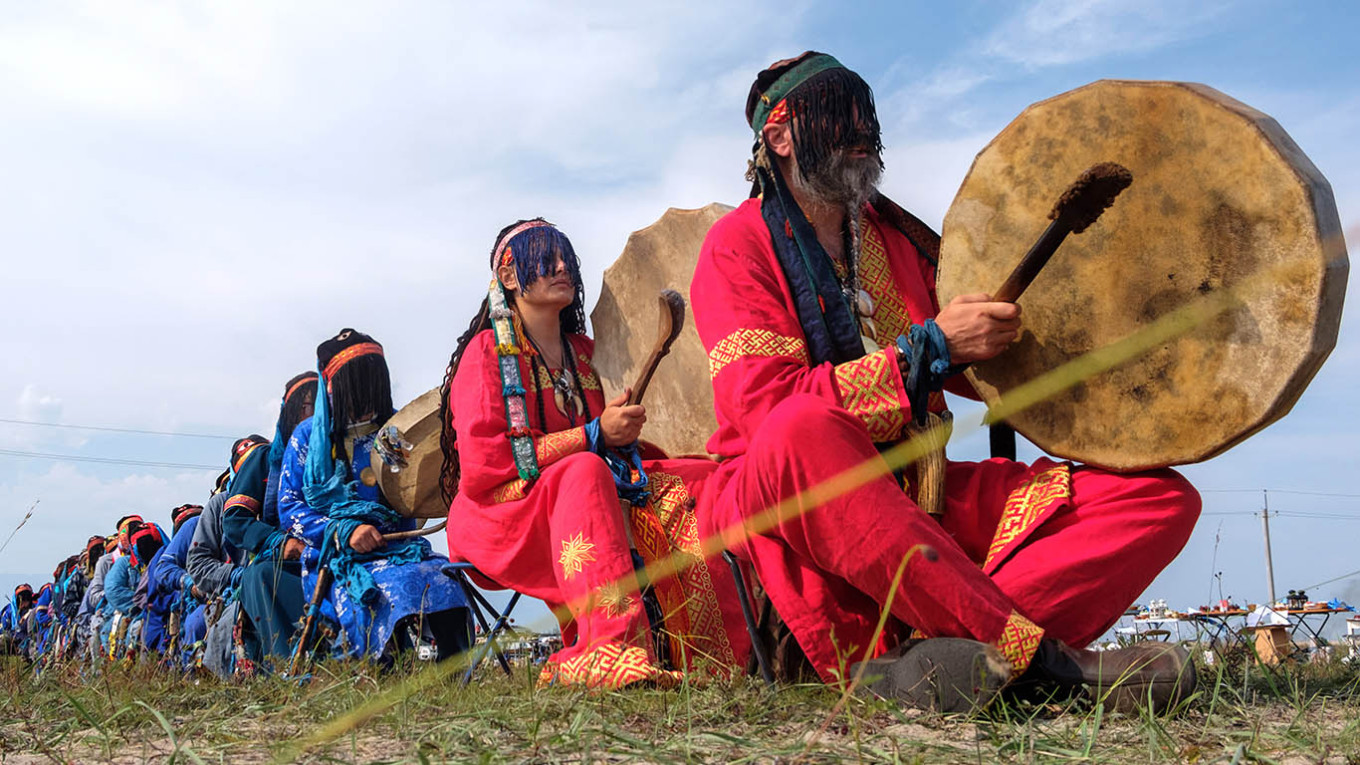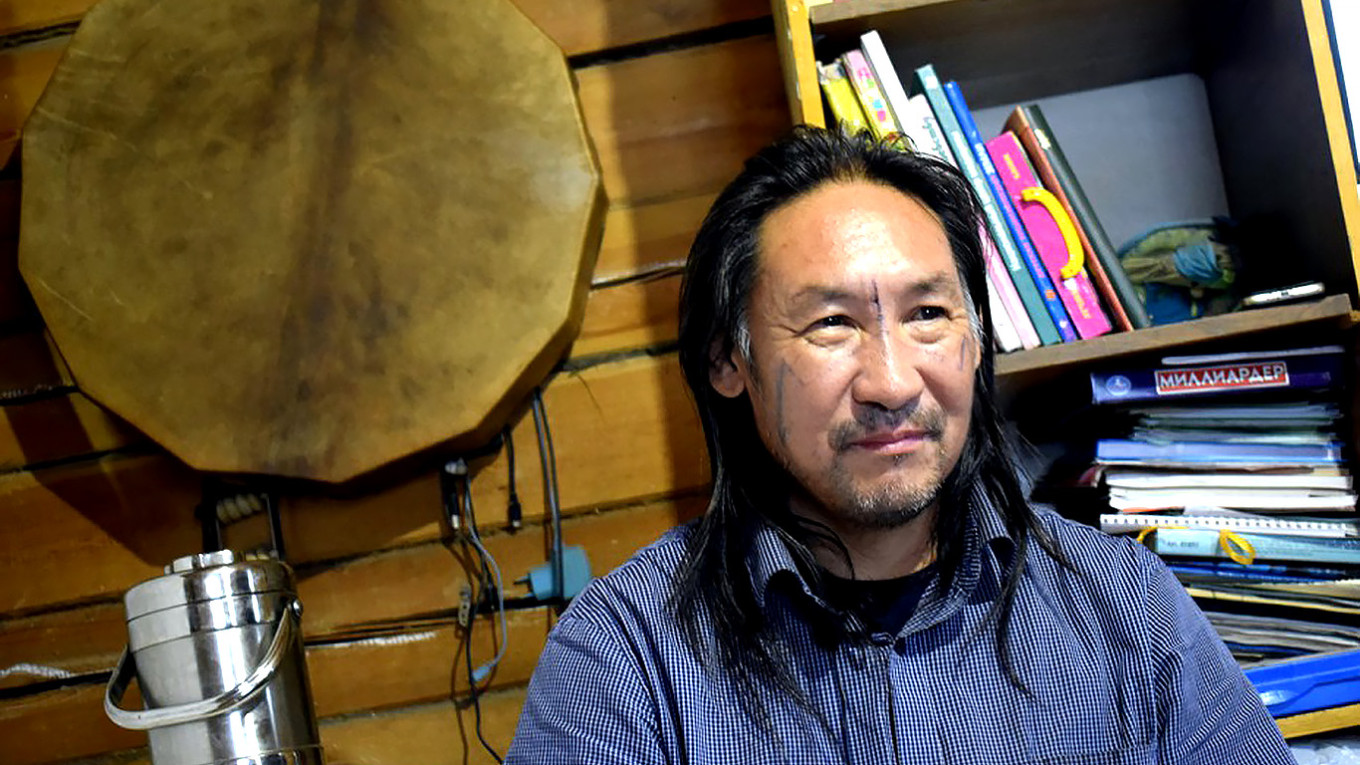Thursday marks five years since Yakutian shaman Alexander Gabyshev was detained by Russian police during his arduous journey from the Far East republic of Sakha (Yakutia) to Moscow.
In March 2019, Gabyshev embarked on an 8,000-kilometer trek with the singular mission to “exorcize” President Vladimir Putin — whom he called the “embodiment of evil” — from his grip on power in Russia.
“Ordinary people are afraid to speak up, afraid of being fired from their jobs, of losing their salaries. The power of our state is boundless, demonic [and] the people were driven into an artificial depression,” Gabyshev told independent news outlet Sibir Realii in July 2019.
“There must be a balance between the state’s power and the people… So the warrior shaman has come to restore that balance,” Gabyshev said when asked about the purpose of his trek.
Although Gabyshev’s ambitious quest for restoring democracy and returning power to the people was cut short by his arrest in the Siberian republic of Buryatia later that year, he managed to amass a cult following during his seven months on the road and made news headlines worldwide.
“He attracted so many ordinary people to his side because he verbalized their pain,” said Sargylana Kondakova of Free Yakutia Foundation, an Indigenous rights and anti-war group from Gabyshev’s native Sakha.
“The farther you go from Moscow, the stronger that pain of injustice is [felt],” Kondakova said.

The Yakutian shaman has spent most of the past five years in psychiatric hospitals, where he has been subjected to life-threatening treatments despite independent medical experts attesting to his mental sanity, according to Gabyshev’s lawyer, Alexey Pryanishnikov.
Gabyshev, who was recognized as a political prisoner by the Memorial human rights group, had explicitly agreed to be included in the August 1 prisoner swap between Russia and the West. Pryanishnikov called it his client’s only hope for freedom.
But the shaman’s name was somehow forgotten during the initial compilation of the Russian political prisoner list and was only added when it was already too late, Pryanishnikov told the Poland-based news outlet Vot Tak.
Despite his extended absence from the spotlight, Gabyshev’s “reputation hasn't suffered at all,” according to Free Yakutia’s Kondakova.
Following Russia’s full-scale invasion of Ukraine in 2022, those who once considered the shaman “a lunatic” started to see the seemingly prophetic nature of his words and the motivations underpinning his singular drive to march on the Kremlin.
“He was right all along,” Kondakova said. “We don't know if it’s a coincidence or if he really had some visions, premonitions and so on. But he predicted this war.”
“He even prophesied that the Sakha people would be wiped off the face of the earth," she said, referring to how military mobilization for the war in Ukraine has disproportionately impacted the republic’s residents — including those from small Indigenous communities.
Since his arrest, Gabyshev has not only gained new supporters on social media, but he has also become the subject of artwork, songs and a documentary film by prominent Yakutia-born filmmaker Beata Bubenec that premiered at One World Film Festival in Czechia earlier this year.
Yet, Gabyshev is not the only self-proclaimed shaman whose popularity soared in recent years.
In Siberia, where shamanistic practices are deeply intertwined with Indigenous traditions and have been preserved despite the Soviet-era crackdown on religion, many are turning back to the spiritual practices of their ancestors.
“There are shamans who truly have a strong gift, and they usually don’t see a lot of people,” said Sholbaana Kuular of New Tuva, an anti-war and decolonial movement from the Siberian republic of Tyva.
“But there are also shamans who have turned it into a business, especially after the start of Russia’s full-scale invasion of Ukraine,” Kuular said. “They make money on military amulets and rituals for life preservation [of soldiers].”

Tyvans, a Turkic ethnic group Indigenous to the modern-day republic of Tyva, are among Russia’s ethnic minority groups disproportionately affected by military mobilization, and they are also overrepresented among casualty figures.
At least 10,000 men from Tyva — or nearly 3% of its entire population — have been sent to the front lines in Ukraine, Putin said earlier this month.
Relatives of these soldiers regularly line up in front of Buddhist temples and shaman’s offices to request rituals for their loved ones’ spiritual protection, according to New Tuva’s sources on the ground.
Some Siberian shamans have publicly backed the war in Ukraine, including Tyva’s own Kara-ool Dopchun-ool, who was elected Head Shaman of Russia in 2018. Many of them, in turn, hold public rituals intended to support the war and protect soldiers.
They also cater to individual clients, though often for an additional fee — some even display the costs of their services on social media and their personal websites.
But while the plight of “warrior shaman” Gabyshev has drawn sympathy from many Siberian natives, others view the wartime popularity of shamanism with concern.
Indigenous people often say that a real shaman never puts a price on their work and rejects hierarchical structures of religions recognized by Russian law.
“In Putin’s Russia, [shamanism] has been approached in a distorted way, they want to turn it into some kind of business,” said Kuular of New Tuva. “Of course, I condemn the shamans who support this regime because [everything they do] looks like a mockery of our culture.”
“They make a lot of money off people’s misery,” she said.
A Message from The Moscow Times:
Dear readers,
We are facing unprecedented challenges. Russia's Prosecutor General's Office has designated The Moscow Times as an "undesirable" organization, criminalizing our work and putting our staff at risk of prosecution. This follows our earlier unjust labeling as a "foreign agent."
These actions are direct attempts to silence independent journalism in Russia. The authorities claim our work "discredits the decisions of the Russian leadership." We see things differently: we strive to provide accurate, unbiased reporting on Russia.
We, the journalists of The Moscow Times, refuse to be silenced. But to continue our work, we need your help.
Your support, no matter how small, makes a world of difference. If you can, please support us monthly starting from just $2. It's quick to set up, and every contribution makes a significant impact.
By supporting The Moscow Times, you're defending open, independent journalism in the face of repression. Thank you for standing with us.
Remind me later.







